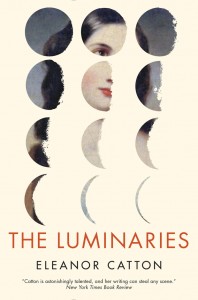Congratulations go to Ms. Catton, as she has the distinct honor of being the first-ever recipient of a one star review from Good e-Reader. Even Willie Nelson’s literary diarrhea musings from his life on the road while high got two stars, mostly for having a cool-looking cover. I’m sure she is not all that affected by the news, having won the Man Booker Prize for this book. Sad, really. I wasn’t aware the pool of eligible titles was so abysmal this year that this book somehow rose to the top.
As with many prestigious award winning books, this one has everything that makes it stand out in the eyes of a snobby, musty committee of literary judges: it’s got a Victorian setting, a unknown journey, gratuitous and inexplicable violence, and opium. Last but not least, it’s 800 pages long. The committee must have awarded it based solely on the sheer amount of effort that went into writing it.
Am I being overly harsh and unnecessarily critical? Of course. Is it because I have a chip on my shoulder about the prize itself as it not only forbids self-published titles but also requires the publisher to throw in 5,000 pounds towards the advertising of the book’s status as a shortlist prize nominee? You betcha. Yes, the Man Booker Prize not only goes to a book published in the UK by a “formal” publishing house (don’t worry, just in case you’re confused and think your book is eligible, the rules are nice enough to state further down that you’re not welcome), but also expects the publishers of the six books whittled down to the shortlist to foot the bill for advertising to the world that this book made it to the finals.
And somehow, this book won.
The best quote on the entire internet about this book is from a review by Sarah Skoletsky: “Here’s my takeaway – gold mining is terrible work, opium seems pleasant, a dress weighing over 5 pounds should be looked into, and it rains a lot in New Zealand.”
I hate to make my negative impression of the book all based on the fact that it’s just another droning example of what passes for prestige in the world of legacy publishing these days, so there are actually valid points to make. The writing is about as wordy as it can possibly get, and the endless cast of characters make it nearly impossible to follow the story line. And just for fun, it has a rather unrefreshing plot–man strikes out for the unknowns of New Zealand to seek his fame and fortune and finds that the rest of the world is also trying to enjoy the prosperity that a whole new economy can offer–that has been done often and done well. This just isn’t one of those times.
Mercy Pilkington is a Senior Editor for Good e-Reader. She is also the CEO and founder of a hybrid publishing and consulting company.
